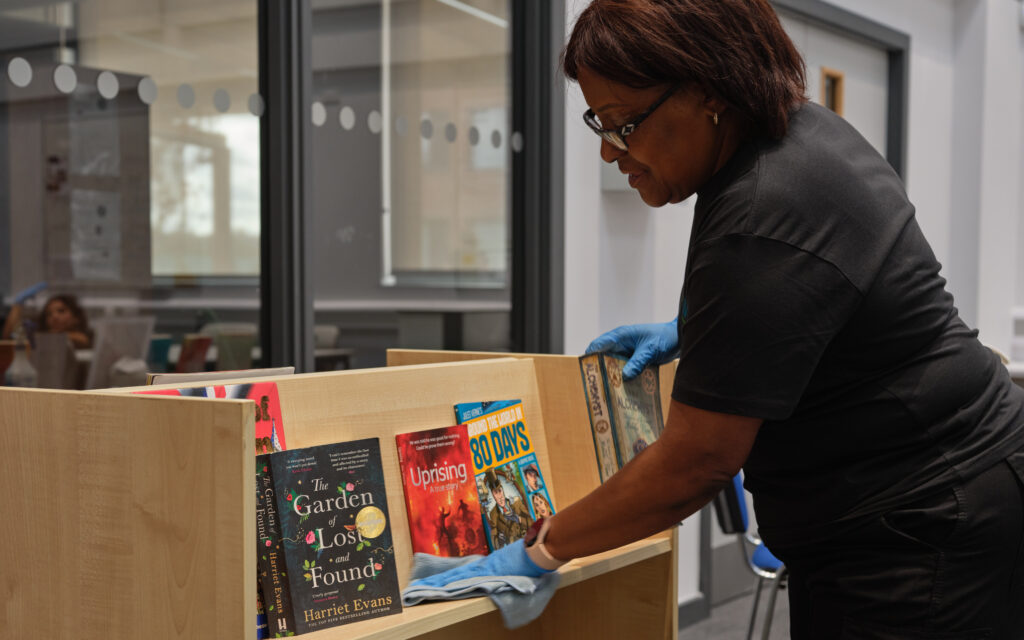Anxiety – What role do cleaners have to play?
01 May 2023 Category: Schools, Academies and Trusts
The focus of this year’s Mental Health Awareness Week is Anxiety. And about time too if you ask me.
Many of our young people experience anxiety. The numbers are increasing year on year with Child and Adolescent Mental Health Services (CAHMs) bursting at the seams. And with referrals taking years in some cases, parents are getting the message that if their child isn’t self-harming then they are one of the lucky ones. But as the parent of a child with debilitating anxiety levels, I can tell you, it certainly doesn’t feel that way.
The impact of anxiety is damaging to the individual, and all the people that they interact with – their friends, families, teachers and the wider community. And its longer-term impact on society? Well, that’s yet to be determined, but with so many young people missing out on learning, scared to try new experiences or push their boundaries, it can’t possibly be a positive impact.
This is not going to go away. A study in the U.S. shows that anxiety was already increasing in young adults long before 2020. Whether this growth in anxiety is caused by Covid-19 and a fear of mixing in groups or whether it’s the continual bad news on the TV and worries over the Cost of Living crisis, or the incessant use of social media, who knows? But it’s here and it’s our role to do everything we can to stop it damaging our young folk and our society permanently.
As a cleaning company specialising in education and community services, we see the impact of this type of anxiety first-hand. We see young people missing out on the school experience – too anxious to fully participate. We see the concerns among their teachers, worried about so much missed learning and the impact this will have on results, and we see the worry in the faces of the families who are doing their best to keep their children in school and functioning as best they can.
So what can school cleaners do to help?
Cleanliness is a sensory experience: we see it, smell it and touch it. A lack of cleanliness might manifest in a smear on a window, a rancid smell from the toilet facilities, or a sticky substance on the underside of a seat. And if your school looks unclean, the chances are students are going to feel anxious about being there.
But increasingly – and thanks to Covid – we are all aware of Hygiene levels. A hygienic school is one free of harmful contaminants. It is a healthy space where air and surfaces are safe to touch and inhale. There is no risk to your building users of being exposed to bacteria, viruses or other pathogens. Put simply, your building will not make any of its users sick.
Most schools have taken steps to improve and monitor their hygiene levels but could keeping the building clean and sharing these results reassure students that they are safe?
Safety is something we feel. It’s the absence of fear and anxiety. We need to be concerned with both the physical and psychological safety of our young people nowadays and we can do this by ensuring that people know they are safe. Fear is corrosive. While a little adrenaline or cortisol can improve cognitive function for a moment, neuroscience studies have found that prolonged exposure to stressful conditions is actively harmful to the brain – impairing working memory, attention, response inhibition and cognitive flexibility.
Anxiety is just as real as physical harm. Going beyond maintaining physical safety, and fostering a sense of safety, is critical for a nurturing educational environment.
So, here are our five top tips to reassure anxious students about your cleaning regime:
1) Ensure high standards of regular cleaning.
2) Tackle spills and stains before they become engrained and affect the fabric of the building.
3) Communicate your hygiene policies and processes clearly to all building users.
4) Report regularly on hygiene metrics so people maintain confidence in your approach.
5) Ensure all building users know how to identify your cleaners and know how to ask them for help.
In the long term, the benefit of integrating this into your school wellbeing plan are:
- A nurturing culture in which people can relax.
- Better performance in all areas of the school.
- Improved mental wellbeing for all building users.
We’re not suggesting for a minute that keeping a school clean and telling people how you do it will stop anxiety in young people. There are a myriad of other issues at play there. But if we can help to reassure anxious students that they can be physically safe in school, then that has to be a step forward.
Melanie Osborne,
Marketing & Communications Director
As a specialist cleaner in educational settings, Nviro provides clean, hygienic and safe environments in universities, colleges and schools. Read our blog about ‘What happens if pupils are worried their school is unclean?’.


